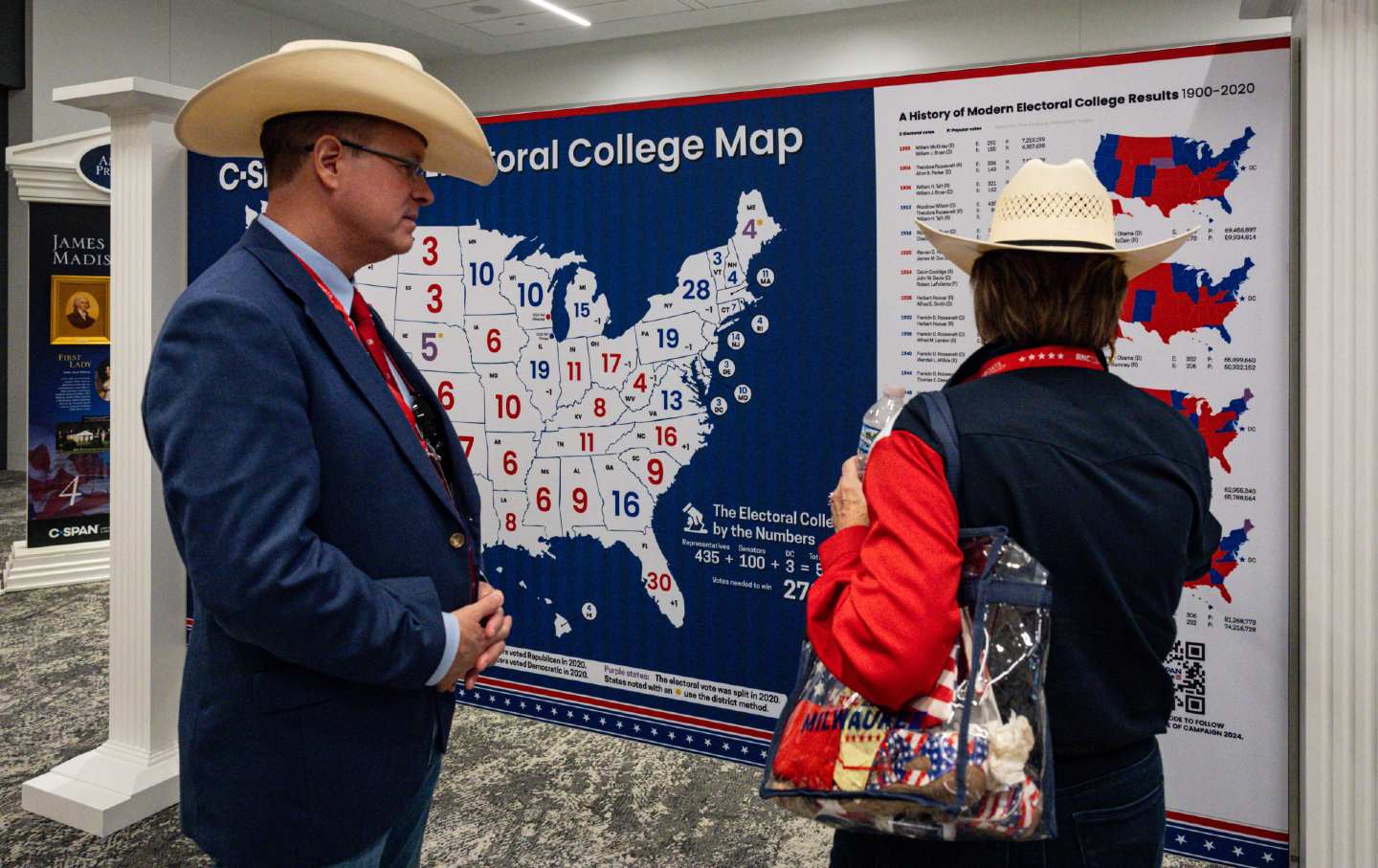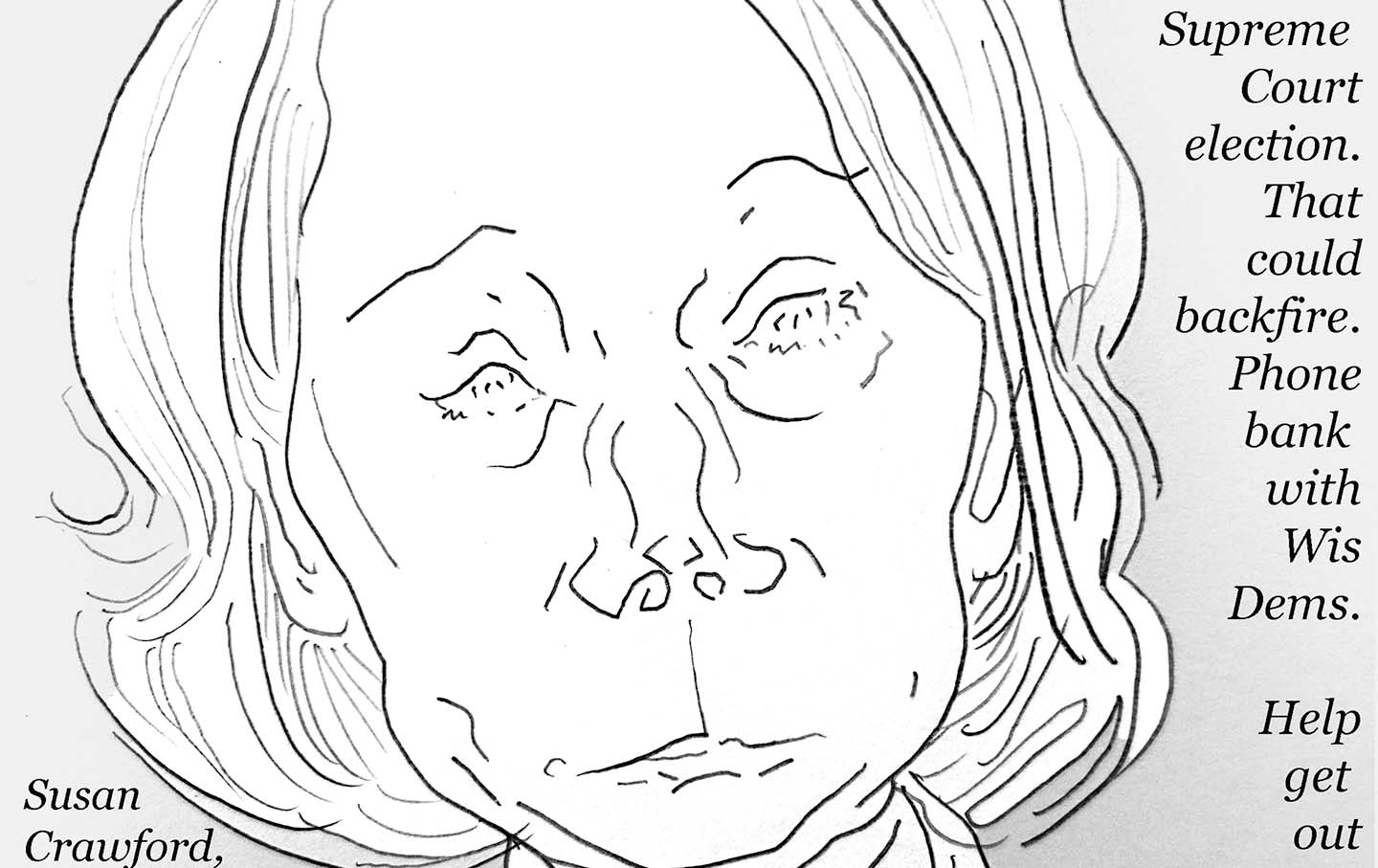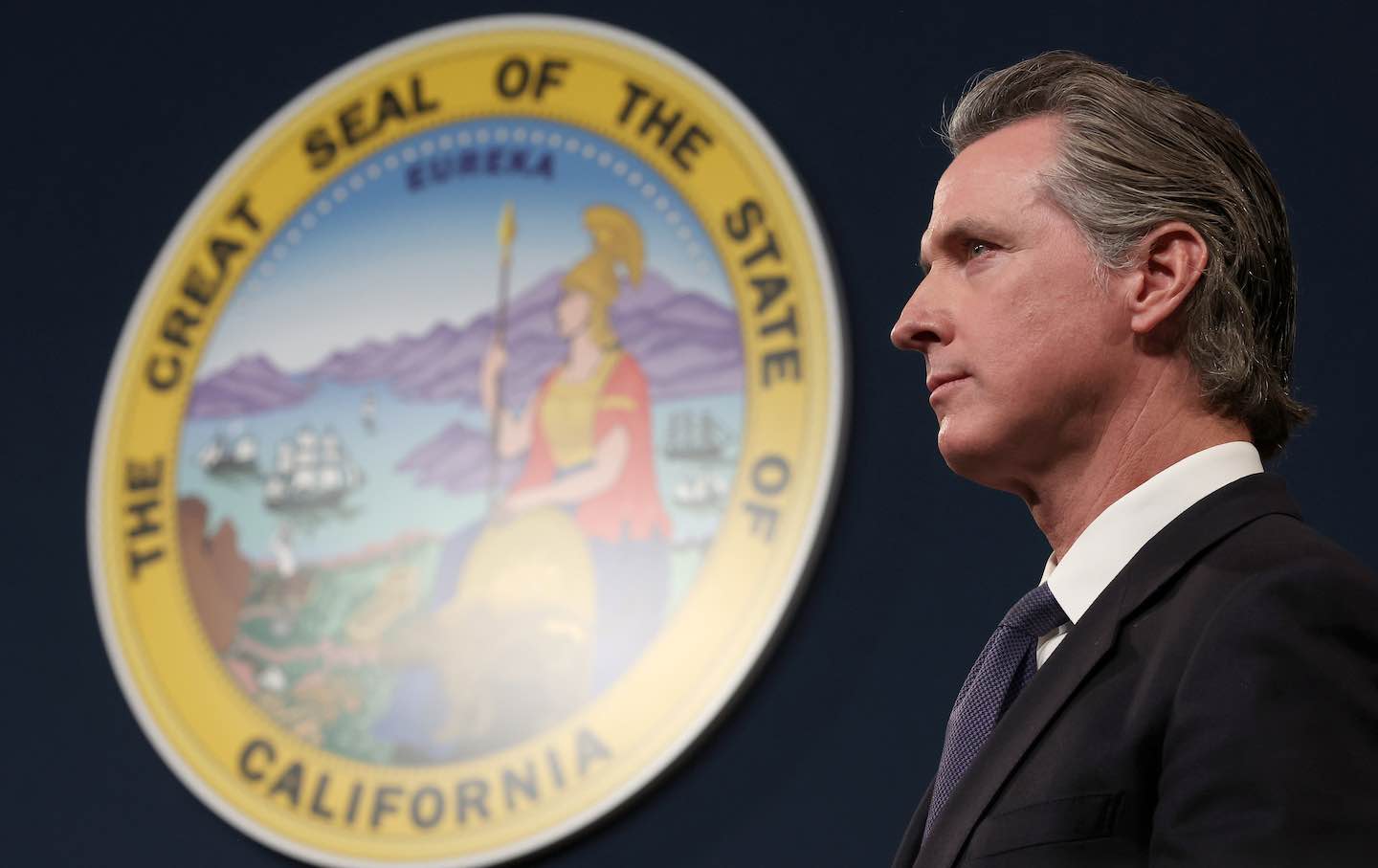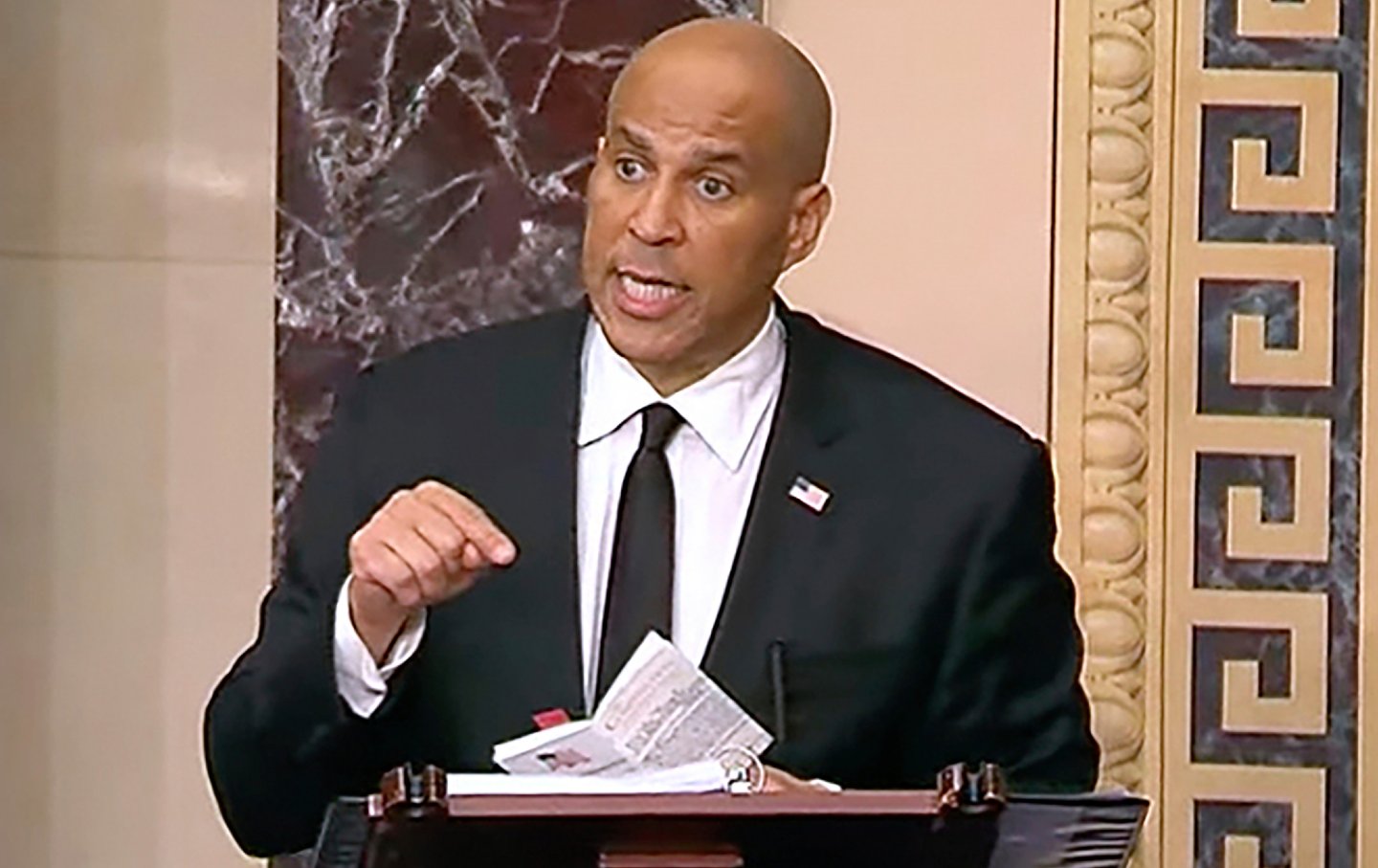A Lesson in Basic Civics for People Who Stubbornly Defend the Electoral College
All the problems with all the reasons some people claim the Electoral College is a good thing.

Attendees at the 2024 Republican National Convention look at a map of the US Electoral College.
(Eva Marie Uzcategui / Bloomberg via Getty Images)
Recently, I was doomscrolling Twitter, reading the Republican-aligned election polls Elon Musk forces into my feed in an effort to make me die from alcohol poisoning. I decided to express my rage (which is the only thing Twitter is good for anymore) at the silent enemy of democracy in this and every election: the Electoral College.
Here is what I tweeted:

As you can see, the thing has 3.8 million views (so far) and generated 13,000 comments. Most people (in my bubble of people who have self-selected to find my tweets) agreed with me, but a bunch of MAGAs found my tweet and used their political science degrees from Things People Are Saying University to express their support for the Electoral College.
I wasn’t terribly surprised that they came after me—I’m used to Republicans who pay for Twitter disagreeing with pro-democracy messages; what struck me was how bad their arguments were. They intuited that the Electoral College is an important cog in their white supremacist machine, but their defense of it was borderline nonsensical. Based on their responses, it’s not entirely clear to me that the people who defend the Electoral College the loudest have any idea how it works—or what it supports other than Donald Trump’s chances of becoming president again.
I would like to respond to these people and correct the record on what the Electoral College does, but I can’t respond to 13,000 comments, and the people who need to hear it most are often resistant to reading and learning. Nevertheless, I think it’s important to not let Republicans completely control the narrative about what this thing does.
What follows is a number of tweets I’ve screen-grabbed that are exemplary of the MAGA defense of the Electoral College. Trigger warning: You are about to see how Republicans really think.
Argument 1

Some version of this argument was, by far, the most common defense of the Electoral College. For that I think we can blame Utah Senator Mike Lee, who is fond of saying, “We live in a republic, not a democracy,” as if he and Nic Cage are the only people who have looked at the Constitution under a black light. Lee usually trots out this line to justify any antidemocratic thing he or his party is up to at the moment, and this lady and/or Russian counterintelligence officer is dutifully using the talking point for the same effect.
It’s a classic example of people mouthing words they don’t fully understand, the same way Danny DeVito voiced The Lorax in a bunch of different languages he doesn’t actually speak simply by reading his lines phonetically. Luckily for me, the community college I went to was in Boston (well, not in Boston, but near Boston), and in addition to studying American history and civics I also studied political philosophy, so I can explain the difference.
The core of the argument—that the United States is not a democracy but a republic—is not wrong; it just has nothing to do with the Electoral College. Being a republic is not a justification for our republic to work anti-democratically. So let’s define some terms: In a “direct democracy,” the people vote for their laws. Every law. All the time. We have some aspects of direct democracy today (voter referendums are an example of direct democracy), as do a number of other nations. The most recent example of direct democracy being applied in the modern context is, probably, Brexit, but you see how that worked out for them. For the most part, direct democracies have proven unworkable throughout history because laws are complicated, and people are busy and largely uninformed.
We, entirely obviously, do not live in a direct democracy (a system of government which is practiced by exactly zero countries today). Instead, yes, we live in a republic. In a republic, representatives of the people vote for the laws that govern the land. How those representatives are chosen differs depending on the republic, but in the United States we have gone with a “democratic republic,” which means that the people (as opposed to a king, or a bank account, or an accident of birth) choose the representatives who, in turn, choose the laws. You can, as this lady does, accurately say we live in a “constitutional” republic, but that modifier doesn’t do much practical work. “Constitutional” just means that the powers of our government are written down, and limited to what’s been written down, but one could just as easily write down a “constitutional monarchy” or even the “constitutional dictatorship” Donald Trump and his Supreme Court seem to want. The democratic choice of our republican representatives is what made our system unique, at its founding.
The question of who counts as “the people” empowered to choose their constitutional representatives has been a manner of some debate throughout the history of republics, but, as of the passage of the 1965 Voting Rights Act (and not one moment before), the US finally decided to be a democratic republic based on universal suffrage for adult citizens. At least on paper, all adult citizens have the franchise and thus the ability to choose their representatives. This is what political philosophers call “self-government.”
Now that everybody understands the basic terms, we can see where our friend goes astray: Far from being a hallmark of a democratic republic, the Electoral College is one of the key parts of our constitutional system that does not follow the principles of democratic republicanism based on universal suffrage and self-government. Instead of voting for the president, we vote for “slates of electors” who are obligated to vote for a particular candidate. The number of electors in the slate is based on the state in which we vote and, because of the way the number of electors is apportioned, violates the principle of one person, one vote. That means that the single elected official who is supposed to represent all of the American people—the president of the United States—is not chosen by a vote of all the American people. It makes the president of our democratic republic the only official who is not a democratically chosen republican representative.
Of course, the people who came up with the Electoral College were not as interested in forming a democratic republic as they were in forming a Western slave empire that would last for perpetuity. Indeed, the nation’s founders also rejected the principles of democratic republican government when it came to the US Senate. Initially, senators were not chosen by a popular vote but by the legislatures from each state. That wasn’t changed until 1913, with the ratification of the 17th Amendment to the Constitution.
In a “constitutional republic” we could switch to a popular vote for the president just as easily as we switched to a popular vote for the Senate, simply by ratifying another amendment. But we haven’t. So let’s get to why the Electoral College is here in the first place, and why Trump cultists wrongly think it still holds value today.
Argument 2

The idea that the Electoral College protects small states and rural voters is the biggest modern lie about what the system does. The EC doesn’t force politicians to give a damn about whether or not a state is “rural”; it forces them to care about whether the margin of victory is close enough in the state to make it worthwhile to campaign there.
Popular
“swipe left below to view more authors”Swipe →We can clearly see this by looking at where the presidential candidates are spending their money and campaign time. An NPR analysis from May showed that the two presidential candidates were spending most of their money in just a few states: Pennsylvania, Michigan, Arizona, Georgia, North Carolina, and Wisconsin. All of those rank in the top 15 states, by population, except for Wisconsin, which is 20th (meaning it’s still in the top half of states by population). The Electoral College does not direct candidates’ campaign time and attention to small states but to big states where the race happens to be tight.
And that doesn’t even tell the full story in terms of the true urban-rural divide. First of all, the idea of a “rural” state is largely a myth. According to the 2020 Census, 80 percent of Americans live in “urban” areas. In only four states—Maine, Mississippi, Vermont, and West Virginia—does a majority of the population live outside of urban areas, and nobody with a straight face would argue that the Electoral College encourages presidential candidates to spend a lot of time and resources in those places.
Of the states that are Electoral College “battlegrounds,” Wisconsin and North Carolina are the only ones where as much as a third of their populations live in rural areas. In all the other battleground states, more than 70 percent of the population lives in urban areas.
We are an urbanized nation. That’s why, even when politicians go to slightly more rural states like Georgia or Michigan, they go to the major cities in those states. They go to where people actually live. Major cities, in relatively populous states, have an outsize share of political power in the Electoral College system as long as those states are close.
So what’s really going on here? Why do so many people believe the Electoral College protects “rural” interests when it demonstrably does not? I believe what’s happening is that these people are using “rural” as a euphemism for “white,” and “urban” as a euphemism for “Black.” The Electoral College protects white interests and sensibilities from being overrun by the emerging non-white majority in this country, and the people who defend the EC are desperate to keep it that way. The “mob rule” these people claim to be afraid of is not, say, mobs of angry whites attacking the Capitol to install the government of the losing presidential candidate; they’re worried about “mobs” of Black people, living in cities, voting for the candidate of their choice, and having their votes count just as much as those of white folks who are spread out around the country.
The thing is, the Electoral College protects those white interests only because of another of its critical features that we haven’t talked about—which brings us to the next terrible argument in its defense.
Argument 3

In 2020, the state where Donald Trump received the most votes was… California. He effectively didn’t campaign there, but he still garnered more raw popular votes there than anywhere else. Yet none of those votes mattered, because the Electoral College is a winner-take-all system.
The most insidious way the Electoral College warps our political process is that, in almost all cases, it awards the full slate of electors to whichever candidate wins a state, even if the margin of victory is only one vote. That functionally disenfranchises entire coalitions of voters, rendering their votes meaningless if they happen to live in a state that is likely to go the other way. Republicans in California have almost no presidential political power, even though there are more Republicans in California than anywhere else, while Democrats in Texas or (latterly) Florida may as well not exist for the purposes of the presidential election.
If you actually care about “rural” voters and their interests (and not just white ones) you should hate the Electoral College. In a winner-take-all system, the votes of rural communities will almost always be dwarfed by those of voters packed into cities. In a national popular vote, rural voters might be able to form coalitions across state lines that could move the needle and couldn’t be ignored by major-party candidates. In the Electoral College system, you can functionally ignore rural voters if you can get enough votes out of Atlanta, Milwaukee, or Philadelphia to win a full slate of Electoral College votes.
This Electoral College effect reverberates outside of the election process, as it gives perverse incentives to whoever wins the presidential election when they are governing. A Republican president can (as Donald Trump did) treat two of the four most populous states in the nation (California and New York) as non-factors, directing federal resources away from the places they are unlikely to win. A Democratic president could do the same to the other two most populous states, Texas and Florida, when they are in charge. Again, in our system, the president is the only person who is supposed to represent all of the people, but the Electoral College tells the president to ignore entire states where their party is unlikely to get 50 percent-plus-one votes.
A couple of people who made the argument that the EC protects the rest of the country from California and New York shared a map produced by National Review columnist Dan McLaughlin purporting to show that under a national popular vote a candidate who won California and New York 75 to 15 but lost every other state 54 to 46 would still win the presidency. (I have not reproduced the map here because I suspect he was pulling numbers out of his ass and my people did not survive the Middle Passage and the Reagan administration so I could be around to fact-check Dan’s cocktail napkins.) But here’s the thing: Can you imagine how world-historically awful a major party presidential candidate would have to be to lose California and New York by 60 points? Trump, of all people, lost California by only 29 percent last time (he got 34.4 percent of the vote to Biden’s 63.5). He lost his home state of New York by 23 percent (he got 38 percent of the vote to Biden’s 61 percent).
Moreover, the idea that someone would win New York by 60 freaking points… but lose New Jersey and Connecticut and everywhere else besides California… is laughable on its face. The Yankees wouldn’t win the popular vote in New York by 60 points, but then lose Connecticut to the Mets.
The idea that a national popular vote system would lead to candidates’ campaigning in California and New York and nowhere else is not an argument that can withstand its first contact with reality, which is why the people who peddle it have to invent fantasies. The idea that California and New York would “control” America in a popular vote system is wrong as a matter of basic mathematics. If everybody’s vote counted equally, everybody’s vote would matter equally.
This isn’t to say that removing the Electoral College would have no effect on campaigns for president. It would. But that just leads to our next argument.
Argument 4

Yes. YES. Thank you for making my argument for me. If the election were determined by the popular vote, candidates, including Donald Trump, would run a campaign designed to get the most votes.
Who thinks that’s a bad thing? Wouldn’t people love to see a campaign designed to “maximize votes” instead of a campaign designed to… denigrate non-white populations living in states where the Electoral College winner is already predetermined? I, for one, would be very interested in what the Republican candidate for president would say if they were actually trying to win the most votes instead of scare a marginal number of white folks in Wisconsin. I can’t say for sure, but I bet their key campaign platforms wouldn’t be “immigrants are eating your dogs” and “rape victims should be forced to bear their assailants’ children.”
Anyway, now that this guy agrees, let’s knock the last ones out, rapid fire.
Generalized Gobbledygook

We haven’t had the same rules for 200 years. The whole point of being a constitutional republic is that we can change the rules—the Constitution—which we have, 27 times so far (including the critical 17th Amendment I mentioned earlier). And fascists don’t change the rules when they don’t get their way. Fascists show up at the Capitol and try to hang people when they don’t get their way.

To paraphrase Luke Skywalker: Every word of that tweet is wrong. First, the Electoral College is literally the mechanism that treats us as 50 countries instead of one. Second, the federal government already imposes its values on the states, and that really only seems to piss off the states when the federal government “values” not letting white people own other people. Third, and most important, Richard Rogers (born in New York City) and Oscar Hammerstein (ditto), are the people who created what you think of as Oklahoma’s values.

The Electoral College does not give all states an equal say. Bigger states have more of a say in the Electoral College. It’s the Senate that gives every state an equal say. The Senate should be abolished, but that’s a different article.

You’re supposed to capitalize the ‘B’ in “Black,” as in the sentence, “The Black lady became the Democratic Party nominee for president when she won the votes of a majority of delegates at the Democratic National Convention.”
So Now What?
It would take a constitutional amendment to get rid of the Electoral College. Amendments must be ratified by three-fourths of the states, and so an amendment abolishing the Electoral College is unlikely to happen as long as voters in small states falsely believe the system gives them more political power than they would have otherwise.
That’s why it’s so important to push back on the false narratives that are being spread about how the Electoral College functions. It does not give voters from small states more of a voice. Instead, it only gives voters from relatively large states an inflated voice if their state happens to have just enough voters from both parties at any particular political moment. In this election cycle, the Electoral College favors Pennsylvania and Georgia. Just a few cycles ago, those battlegrounds were Florida and Ohio. In the future, the battlegrounds might be Texas or California. The Electoral College is agnostic as to which states have the power; it just requires that the people themselves are treated unfairly and unequally.
The Electoral College is a terrible way to choose a leader in a democracy. Or a republic. It’s terrible precisely because it takes the choice away from people and gives it to the land the people happen to be living on when they try to vote. It’s a system that was designed to protect slavery and still functions to protect white people from having to engage with a browning country. It’s working exactly like it was intended, and that is its biggest problem.
Unfortunately, it will be with us as long as Republicans rightly perceive that it is the only way for them to win power for their demonstrably unpopular agenda.
But there will be a moment, someday in the future, when the political calculation will flip. A Democrat will tap into the still-unrealized political power of Black folks living in former Confederate states and win narrow victories in not just Georgia but places like Louisiana, Mississippi, and South Carolina. White folks in Wisconsin and Minnesota will strenuously object, but it won’t matter because of the Electoral College. As soon as a Democrat loses the popular vote but wins an Electoral College victory thanks to the support of Black and brown people in currently red states, Republican white folks will suddenly become very interested in getting rid of the Electoral College.
Democrats must seize that moment, when it comes. Getting rid of a vestige of slavery will always benefit non-white people in the long run, even if it means sacrificing a temporary political advantage.
I’ll likely be dead by the time that moment arrives, so I consider this my preemptive reminder to future generations: The Electoral College is stupid and must be abolished.








